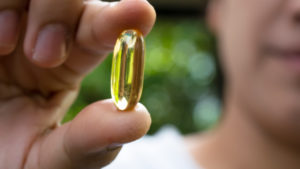 GLA (gamma linolenic acid) – a fatty acid that helps burn fat to promote weight loss and help control the appetite to prevent weight gain.
GLA (gamma linolenic acid) – a fatty acid that helps burn fat to promote weight loss and help control the appetite to prevent weight gain.
There are several different types of omega-6 fatty acids. Most omega-6 fatty acids in the diet come from vegetable oils in the form of linoleic acid (LA). The body converts linoleic acid to GLA and then to arachidonic acid (AA). You can get GLA from several plant-based oils, including evening primrose oil (EPO), borage oil, and black currant seed oil. Most of these oils also contain some linoleic acid.
A healthy diet contains a balance of omega-3 and omega-6 fatty acids. Omega-3 fatty acids help reduce inflammation while some omega-6 fatty acids promote inflammation. The typical American diet contains 14 to 25 times more omega-6 fatty acids than omega-3 fatty acids. Many physicians blame this high rate of omega-6 to omega-3 fatty acids for the large number of inflammatory diseases in the American population.
For your overall health, you should get a balance of omega-6 and omega-3 fatty acids. There is much disagreement in the nutrition field about what constitutes the proper ratio of omega-6 to omega-3 fatty acids in one’s diet. The average diet provides plenty of omega-6 fatty acids. So most people do not need supplements. You may want to ask your doctor about taking omega-6 supplements if you have a condition such as eczema or psoriasis, arthritis, diabetes, or breast tenderness (mastalgia).
Because of the potential for side effects and interactions with medications, you should only take dietary supplements under the supervision of a knowledgeable health care provider.
DO NOT take omega-6 fatty acids if you have a seizure disorder. Several reports describe seizures in people taking EPO. Some of these seizures developed in people with a previous seizure disorder, or in people taking epoin combination with anesthetics. People who plan to have surgery requiring anesthesia should stop taking evening primrose oil 2 weeks ahead of time.



March 7, 2018
Au Naturale – Product Pick
There are several different types of omega-6 fatty acids. Most omega-6 fatty acids in the diet come from vegetable oils in the form of linoleic acid (LA). The body converts linoleic acid to GLA and then to arachidonic acid (AA). You can get GLA from several plant-based oils, including evening primrose oil (EPO), borage oil, and black currant seed oil. Most of these oils also contain some linoleic acid.
A healthy diet contains a balance of omega-3 and omega-6 fatty acids. Omega-3 fatty acids help reduce inflammation while some omega-6 fatty acids promote inflammation. The typical American diet contains 14 to 25 times more omega-6 fatty acids than omega-3 fatty acids. Many physicians blame this high rate of omega-6 to omega-3 fatty acids for the large number of inflammatory diseases in the American population.
For your overall health, you should get a balance of omega-6 and omega-3 fatty acids. There is much disagreement in the nutrition field about what constitutes the proper ratio of omega-6 to omega-3 fatty acids in one’s diet. The average diet provides plenty of omega-6 fatty acids. So most people do not need supplements. You may want to ask your doctor about taking omega-6 supplements if you have a condition such as eczema or psoriasis, arthritis, diabetes, or breast tenderness (mastalgia).
Because of the potential for side effects and interactions with medications, you should only take dietary supplements under the supervision of a knowledgeable health care provider.
DO NOT take omega-6 fatty acids if you have a seizure disorder. Several reports describe seizures in people taking EPO. Some of these seizures developed in people with a previous seizure disorder, or in people taking epoin combination with anesthetics. People who plan to have surgery requiring anesthesia should stop taking evening primrose oil 2 weeks ahead of time.